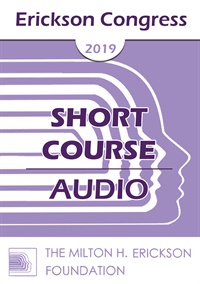
- Average Rating:
- Not yet rated
- Topic Areas:
- Short Courses | Experiential Therapy | Psychotherapy | Therapist Development
- Categories:
- Erickson Congress | Erickson Congress 2019
- Faculty:
- Robert Staffin, PsyD, ABPH
- Duration:
- 1 Hour 30 Minutes
- Format:
- Audio Only
- Original Program Date:
- Dec 12, 2019
- Short Description:
- Often, being dubbed a "master" means that what the teacher does cannot be done by others. However, a cornerstone of Jeffrey Zeig's lifelong quest has been to demystify, annotate, and democratize Milton H. Erickson's work and then his own. In this session, the presenter will map the breadth and scope of Zeig's work, which he has augmented by integrating a theoretical and experimental corpus with the most effective practices of the arts: film, music, theater, literature, and dance.
- Price:
- $15.00 - Base Price
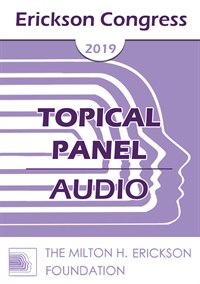
- Average Rating:
- Not yet rated
- Topic Areas:
- Workshops | Binds | Conflict | Therapist Development
- Categories:
- Erickson Congress | Erickson Congress 2019
- Faculty:
- Robert Dilts, BA
- Duration:
- 1 Hour 59 Minutes
- Format:
- Audio Only
- Original Program Date:
- Dec 12, 2019
- Short Description:
- A “double bind” is a special type of conflict which creates a “no-win” situation; i.e., a situation in which one is “damned if you do, and damned if you don’t.” According to anthropologist Gregory Bateson, who originally defined the notion of the double bind, such conflicts are at the root of both creativity and psychosis. The difference is whether or not one is able to identify and transcend the bind in an appropriate way. This workshop will cover some of the key skills necessary to identify the underlying conditions which create conflicts double binds, and thus to resolve them.
- Price:
- $15.00 - Base Price
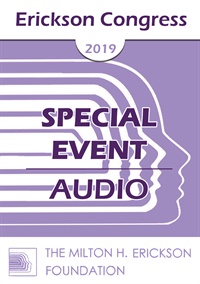
- Average Rating:
- Not yet rated
- Topic Areas:
- Hypnosis | Self-Hypnosis | Multicultural | Therapist Development
- Categories:
- Erickson Congress | Erickson Congress 2019
- Faculty:
- Roxanna Erickson Klein, RN, PhD, LPC, LCDC | Alejandra Diaz, LPC
- Duration:
- 4 Hours 7 Minutes
- Format:
- Audio Only
- Original Program Date:
- Dec 11, 2019
- Short Description:
- This event is designed to educate professionals about the power of self- hypnosis. The workshop offers an experiential approach that is brought together by comparing and contrasting the learning backgrounds from the two co-presenters. Each bringing different life experiences, cultural elements are identified and utilized to facilitate participants’ individual creation of their own learning pathway.
- Price:
- $15.00 - Base Price
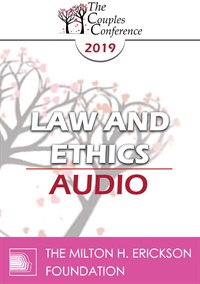
Credit available - Click Here for more information
- Average Rating:
- Not yet rated
- Topic Areas:
- Law & Ethics | Continuing Education | Couples Therapy | Family Therapy | Therapist Development
- Bundle:
- CC19 Main Conference Audio Bundle
- Categories:
- Couples Conference | Couples Conference 2019 | Online Continuing Education
- Faculty:
- A. Steven Frankel, PhD, JD, ABPP
- Duration:
- 2:59:37
- Format:
- Audio Only
- Original Program Date:
- Apr 11, 2019
- Short Description:
- This six-hour program seeks to provide information and recommendations for mental health professionals whose work includes the assessment and treatment of couples and families. The program begins with an update on legal and ethical developments that affect providers, and then moves to a discussion of risk management strategies for clinicians, including the most critical issues faced by clinicians in their work.
- Price:
- $15.00 - Base Price
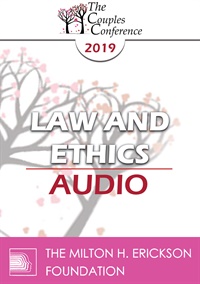
Credit available - Click Here for more information
- Average Rating:
- Not yet rated
- Topic Areas:
- Law & Ethics | Continuing Education | Couples Therapy | Family Therapy | Therapist Development
- Bundle:
- CC19 Main Conference Audio Bundle
- Categories:
- Couples Conference | Couples Conference 2019 | Online Continuing Education
- Faculty:
- A. Steven Frankel, PhD, JD, ABPP
- Duration:
- 2:01:41
- Format:
- Audio Only
- Original Program Date:
- Apr 11, 2019
- Short Description:
- This six-hour program seeks to provide information and recommendations for mental health professionals whose work includes the assessment and treatment of couples and families. The program begins with an update on legal and ethical developments that affect providers, and then moves to a discussion of risk management strategies for clinicians, including the most critical issues faced by clinicians in their work.
- Price:
- $15.00 - Base Price
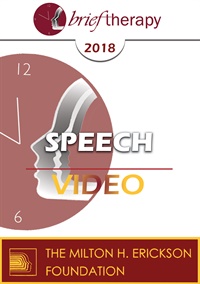
Credit available - Click Here for more information
- Average Rating:
- Not yet rated
- Topic Areas:
- Speeches | Brief Therapy | Neuroscience | Psychotherapy | Therapist Development
- Categories:
- Brief Therapy Conference | Brief Therapy Conference 2018 | Online Continuing Education
- Faculty:
- Michael Yapko, PhD
- Course Levels:
- Master Degree or Higher in Health-Related Field
- Duration:
- 1:02:31
- Format:
- Audio and Video
- Original Program Date:
- Dec 09, 2018
- Short Description:
- Conventional wisdom can guide us but also confuse us when seemingly good pieces of advice contradict each other (e.g., “Look before you leap…BUT he who hesitates is lost”). How can someone know when to do this rather than do that? How can we help clients make better decisions in order to improve the quality of their lives? The fields of cognitive neuroscience and phenomenology have offered us many insights into decision-making processes and some of these will be discussed as they apply to the context of active, short-term psychotherapies.
- Price:
-
Sale is $29.00
price reduced from Base Price - $59.00
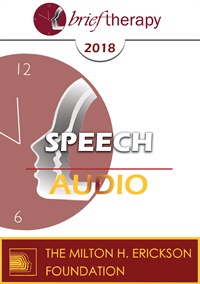
- Average Rating:
- Not yet rated
- Topic Areas:
- Speeches | Brief Therapy | Couples Therapy | Therapist Development | Relationships
- Categories:
- Brief Therapy Conference | Brief Therapy Conference 2018
- Faculty:
- Stan Tatkin, PsyD, MFT
- Duration:
- 1:11:45
- Format:
- Audio Only
- Original Program Date:
- Dec 09, 2018
- Short Description:
- This one-hour speech focuses on what all couple therapists should at least consider: social justice and fairness agreements between partners. The human primate is warlike, self-centered, mostly automatic, and given to flights of fancy, moodiness, and other unpredictable feelings, thoughts, and behaviors. Thus, the social science predicate of civilization dictates that, to hold human beings accountable, there must be agreements between individuals that protect them from one another. Shared principles of governance points to the matter of partners governing each other and everyone else as the couple is the smallest unit of a society. Principles are hierarchically more personal and self-governing than rules or laws. In other words, principles speak to character.
- Price:
- $15.00 - Base Price
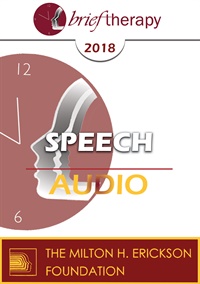
- Average Rating:
- Not yet rated
- Topic Areas:
- Speeches | Brief Therapy | Ericksonian Hypnosis and Therapy Techniques | Therapist Development
- Categories:
- Brief Therapy Conference | Brief Therapy Conference 2018
- Faculty:
- Jeffrey Zeig, PhD
- Duration:
- 1:00:38
- Format:
- Audio Only
- Original Program Date:
- Dec 09, 2018
- Short Description:
- One way of modeling Milton Erickson is to consider the states that he commonly inhabited when he was conducting psychotherapy. Erickson "states" will be described and examples will be provided.
- Price:
- $15.00 - Base Price
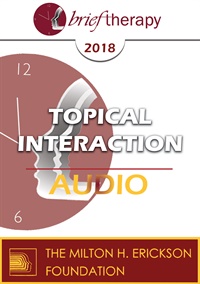
- Average Rating:
- Not yet rated
- Topic Areas:
- Topical Interactions | Psychotherapy | Brief Therapy | Therapeutic Relationship | Therapist Development
- Categories:
- Brief Therapy Conference | Brief Therapy Conference 2018
- Faculty:
- Stephen Gilligan, PhD
- Duration:
- 1:04:33
- Format:
- Audio Only
- Original Program Date:
- Dec 08, 2018
- Short Description:
- Every meaningful therapy conversation includes a significant presence of difficult emotions--symptoms, responses, anger, fear, etc. We will have a conversation about how to skillfully welcome and utilize such negative experiences as integral parts of a successful, creative therapy.
- Price:
- $15.00 - Base Price
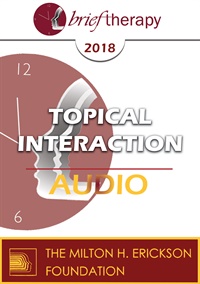
- Average Rating:
- Not yet rated
- Topic Areas:
- Topical Interactions | Feedback Informed Treatment (FIT) | Tailoring | Relationships | Therapeutic Relationship | Therapist Development
- Categories:
- Brief Therapy Conference | Brief Therapy Conference 2018
- Faculty:
- Scott Miller, PhD
- Duration:
- 57:17
- Format:
- Audio Only
- Original Program Date:
- Dec 08, 2018
- Short Description:
- Available evidence indicates that the effectiveness of psychotherapy has not improved despite 100 years of theorizing and research. What would help? Not learning a new model of therapy or the “latest” so-called “evidence-based” treatment approach. A simple, valid, and reliable alternative exists for maximizing the effectiveness and efficiency of treatment based on using ongoing feedback to empirically tailor services to the individual client needs and characteristics. Research from multiple randomized clinical trials documents that this simple, transtheoretical approach as much as doubles the effectiveness of treatment while simultaneously reducing costs, drop-out rates and deterioration. At this "Topical Interaction," participants will have a chance to address any practical issues, questions or challenges associated with incorporating outcome and alliance measures into their practice.
- Price:
- $15.00 - Base Price
Please wait ...

